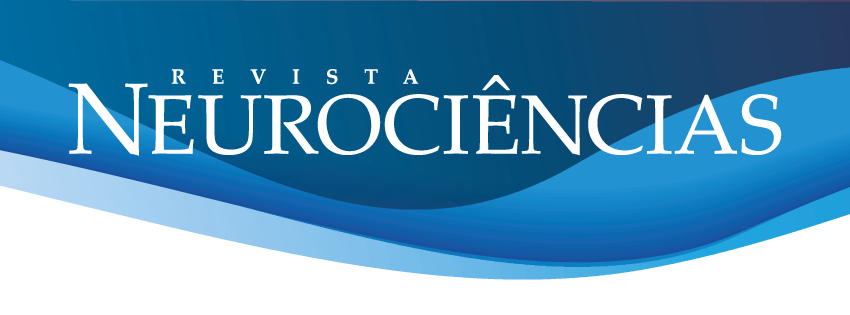Critérios de diagnóstico de Morte Encefálica: a experiência de médicos com o atual protocolo
DOI:
https://doi.org/10.34024/rnc.2023.v31.15557Palavras-chave:
Morte Encefálica, Protocolo, Médicos, Educação médicaResumo
Introdução. A morte encefálica (ME) é definida pela perda completa e irreversível das funções cerebrais e de tronco cerebral. Seu diagnóstico segue critérios clínicos específicos, o que requer conhecimento e habilidades médicas. Objetivo. Verificar o conhecimento e a experiência dos médicos acerca do atual protocolo de diagnóstico de ME. Método. Estudo quantitativo, exploratório, descritivo e transversal, com participação de 99 médicos de um hospital de referência em atendimento ao trauma, da região metropolitana de Belém. A coleta de dados ocorreu entre outubro de 2021 a junho de 2022. Foi aplicado um questionário elaborado pelos autores contendo perguntas sobre o conhecimento e a experiência com o protocolo de ME. Resultados. 60,6% dos participantes eram do sexo masculino, com idade entre 20 e 39 anos (75,8%) e graduação entre 2011 a 2020 (50,5%). Considerando as especialidades, houve melhor desempenho entre os participantes que eram médicos neurocirurgiões (p=0,003). Também houve maior número de acertos nos seguintes grupos: médicos que foram responsáveis pela abertura de protocolo de ME (p<0,001), os que possuíam experiência anterior no atendimento a pacientes em coma (p=0,003), aqueles que haviam participado de treinamento/capacitação (p<0,001). Ainda, 39,4% dos médicos relataram se sentir desconfortáveis ao ter que comunicar o diagnóstico aos familiares. Quanto à introdução do tema na graduação, 28,3% relataram como ruim. Conclusão. Os achados revelaram que há lacunas no conhecimento sobre o atual protocolo de ME, particularmente durante a formação acadêmica, sendo necessário uma maior discussão sobre o tema ainda na graduação.
Métricas
Referências
Conselho Federal De Medicina. Definição dos critérios para diagnóstico de morte encefálica. Resolução n°2.173, de 23 de novembro de 2017 (endereço na Internet). 2017 (acessado em: 2023). Disponível em: 19140504-resolucao-do-conselho-federal-de-medicina-2173-2017.pdf
Westphal GA, Veiga VC, Franke CA. Determinação da morte encefálica no Brasil. Rev Bras Ter Intensiva 2019;31:404-9. https://doi.org/10.5935/0103-507X.20190050
Walter K. Brain Death. JAMA 2020;324:1116. https://doi.org/10.1001/jama.2020.15898
Souza DRS, Tostes PP, Silva AS. Morte encefálica: Conhecimento e opinião dos médicos da Unidade de Terapia Intensiva. Rev Bras Edu Med 2019;43:115-22. https://doi.org/10.1590/1981-52712015v43n3RB20180122
Chehuen Neto JA, Ferreira RE, Assad IM, Santos IA, Santos JLCT, Paula LC, et al. Atualização dos critérios diagnósticos de morte encefálica: aplicação e capacitação dos médicos. Rev Bras Ter Intensiva 2019;31:303-11. https://doi.org/10.5935/0103-507X.20190055
Vasconcelos TF, Menegueti MG, Corsi ACC, Barbosa JM, Sato L, Basile Filho A, et al. Assessment of physicians’ knowledge about brain death and organ donation and associated factors. Medicine (Baltimore) 2022;101:1-5. https://doi.org/10.1097/MD.0000000000030793
Paixão JTC, Nascimento VHN, Alves MC, Rodrigues MFA, Sousa EJS, Lobato BLS. Analysis of brain death declaration process and its impact on organ donation in a reference trauma center. Einstein (São Paulo) 2020;18:1-6. https://doi.org/10.31744/einstein_journal/2020AO5448
Magalhães JV, Veras KN, Mendes CMM. Avaliação do conhecimento de médicos intensivistas de Teresina sobre morte encefálica. Rev Bioét 2016;24:156-64. https://doi.org/10.1590/1983-80422016241117
Sodré ACBM, Cajado MCV. Doação de órgãos e tecidos para transplantes: experiências na pandemia da COVID-19. Res Soc Developm 2022;11:e61111334168. https://doi.org/10.33448/rsd-v11i13.34168
Silva FAA, Cunha DSP, Lira JAC, Ribeiro JF, Campelo GVS, Nunes BMVT. Morte encefálica e manutenção de órgãos: conhecimento dos profissionais intensivistas. Rev Enferm UFPE 2018;12:51-8. https://doi.org/10.5205/1981-8963-v12i1a25130p51-58-2018
Antonucci AT, Sganzerla A, Shiavini M, Neto AR, Lehmann MF, Siqueira JE. Morte Encefálica como problema bioético na formação médica. Rev Bioét 2022;30:272-83. https://doi.org/10.1590/1983-80422022302524PT
Dibo FH, Gravena AA, Freitas RA, Dell’Agnolo CM, Benguella EA, Pelloso SM, et al. Brain Death: Knowledge of Future Brazilian Physicians. Transplant Proc 2017;49:750-5. https://doi.org/10.1016/j.transproceed.2017.01.069
Bittencourt AGV, Neves FBCS, Durães L, Nascimento DT, Neves NMBC, Torreão LA, et al. Avaliação do Conhecimento de Estudantes de Medicina sobre Morte Encefálica. Rev Bras Ter Intens 2007;19:144-50. https://doi.org/10.1590/S0103-507X2007000200002
Knihs NS, Feisther LC, Santos J, Silva RM, Paim SM, Schirmer J, et al. Comunicação da morte encefálica junto aos pais de crianças e adolescentes: estratégias de cuidados. Rev Bras Enferm 2022;75:1-7. https://doi.org/10.1590/0034-7167-2021-0943pt
Szydło M, Mijalska A, Koziara K, Głowiński J. Attitudes Toward and Knowledge of Brain Death and Deceased Organ Donation Among Anesthesiologists in the Northeastern Region of Poland. Transplant Proc 2022;54:864-73. https://doi.org/10.1016/j.transproceed.2022.03.019
Vogel KP, Silva JHG, Ferreira LC, Machado LC. Comunicação de Más Notícias: Ferramenta Essencial na Graduação Médica. Rev Bras Educ Med 2019;43:314-21. https://doi.org/10.1590/1981-5271v43suplemento1-20180264
Ferraz MAG, Chaves BA, Silva DP, Jordán APW, Barbosa LNF. Comunicação de más notícias na perspectiva de médicos oncologistas e paliativistas. Rev Bras Educ Med 2022;46:1-7. https://doi.org/10.1590/1981-5271v46.2-20210458
Gesser AM, Santos MS, Gambetta MV. Spikes: um protocolo para a comunicação de más notícias. Braz J Develop 2021;7:103334-45. https://doi.org/10.34117/bjdv7n11-111
Siqueira NL, Fernandes CA. Comunicação da suspeita e abertura do protocolo de morte encefálica: percepções e preferências da família. REAS 2023;23:e12696. https://doi.org/10.25248/reas.e12696.2023
Marcelo KCFR, Dias SAC, Souza CP, Almeida CG, Gonzaga MFN, Pacher KAS. Tomada de decisão das famílias na doação de órgãos: um olhar para a negativa familiar. Rev Saúde Foco 2020;12:453-62. https://portal.unisepe.com.br/unifia/wp-content/uploads/sites/10001/2020/12/TOMADA-DE-DECIS%C3%83O-DAS-FAM%C3%8DLIAS-NA-DOA%C3%87%C3%83O-DE-ORG%C3%83OS-UM-OLHAR-PARA-A-NEGATIVA-FAMILIAR-453-%C3%A0-462.pdf
Teixeira RKC, Gonçalves TB, Silva JAC. A intenção de doar órgãos é influenciada pelo conhecimento populacional sobre morte encefálica? Rev Bras Ter Intensiva 2012;24:258-62. https://doi.org/10.1590/S0103-507X2012000300009
Kute V, Ramesh V, Shroff S, Guleria S, Prakash J. Deceased-Donor Organ Transplantation in India: Current Status, Challenges, and Solutions. Exp Clin Transplant 2020;18:31-42. https://doi.org/10.6002/ect.rlgnsymp2020.L6
Ghorbani F, Khoddami-Vishteh HR, Ghobadi O, Shafaghi S, Louyeh AR, Naiafizadeh K. Causes of family refusal for organ donation. Transplant Proc 2011;43:405-6. https://doi.org/10.1016/j.transproceed.2011.01.031
Minidicionário Houaiss da Língua Portuguesa. 3 ed. Rio de Janeiro: Objetiva-Moderna, 2008.
Downloads
Publicado
Edição
Seção
Licença
Copyright (c) 2023 Letícia Fonseca Macedo, Thalita da Rocha Bastos, Yasmim Carmine Brito da Silva, Hideraldo Luis Souza Cabeça, Ana Cristina Vidigal Soeiro

Este trabalho está licenciado sob uma licença Creative Commons Attribution 4.0 International License.
Como Citar
Aprovado 2023-09-13
Publicado 2023-09-20


